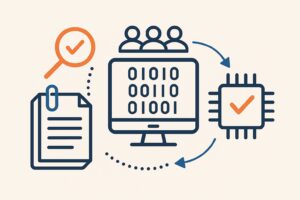From Documents to Decisions: Building Trust in Mortgage Data
August 15, 2025
Introduction: A Silent Threat in Mortgage Tech
Mortgage lenders today are doubling down on automation—streamlining workflows, accelerating decisions, and integrating tools like income calculators, eligibility evaluators, and AUS engines into every stage of origination. Yet many are missing one critical piece: the origin and integrity of the data these tools rely on. Without robust data provenance, these systems are built on a foundation of sand.
Data provenance—the ability to trace every data point back to its original source and verify its accuracy—isn’t a luxury. It’s the backbone of trusted automation. And without it, lenders are taking on unnecessary risk, operational inefficiency, and compliance exposure.
Garbage In, Garbage Out: The Illusion of Automation
Automation is only as good as the data you feed it. Income calculators, eligibility evaluators, and AUS platforms are designed to accelerate underwriting decisions, but they become liabilities when powered by incorrect or incomplete data.
According to Fannie Mae’s Q1 2024 Loan Quality Report, documentation defects in income and employment verification remain among the top contributors to overall loan defect rates.
These aren’t edge cases. They’re widespread:
- An outdated paystub used instead of the latest uploaded version.
- A bank statement interpreted without factoring in a corrected deposit history.
- Data fields mismatched across versions of the same document.
Each of these represents a breakdown in data lineage. And each one puts the lender at risk of delays, repurchase demands, or compliance violations.
The Risk of Data Without a Paper Trail
By the time a loan closes, can your team prove the origin of every key data point? Can they show not just which document it came from, but which version of that document?
If the answer is no, then you’re exposed.
Lenders routinely make credit decisions based on data extracted from borrower documents. But if that data is later found to be inaccurate—and you can’t prove that the decision was made using valid inputs—you face heightened exposure:
- Repurchase risk due to unverifiable income or assets
- Compliance penalties for inaccurate disclosures
- Operational inefficiencies from late-stage rework
These risks stem from a single root cause: lack of data provenance.
Vallia LoanReady Document Intelligence: Built for Trustworthy Automation
Brimma’s Vallia LoanReady Document Intelligence addresses this challenge head-on. It is not simply another data extraction tool—it is a data trust engine.
Here’s how it delivers data provenance and mitigates risk:
- Document Version Control: Vallia captures the timestamp for every document ingested. No more ambiguity about which document a value came from.
- Confidence-Scored Data Extraction: Using AI models optimized for mortgage-specific documents, Vallia assigns a confidence score to each extracted data field—allowing your team to focus on exceptions rather than review everything.
- Validation at Three Levels:
- Field-Level Validation: Does the extracted value fall within expected ranges?
- Document-Level Validation: Are all values on the document internally consistent?
- Cross-Document Validation: Do values across related documents (e.g., paystub vs. W2) align?
- Does the data align to the current values persisted within your LOS and/or servicing system?
- Actionable Exceptions, Not Noise: Vallia doesn’t flood teams with false positives. Instead, it only flags data when it falls below a confidence threshold or fails validation—allowing lenders to apply their “secret sauce” on top of trusted data.
- Audit-Ready Lineage: Every data point can be traced back to its origin. That means you can show regulators and investors exactly how your decisions were made.
- Missing Documents Solved: Vallia LoanReady Document Intelligence also solves the problem where you lack key documents that are required to have a complete package. And it can hook directly into your workflow so that you can get notified when your data problem is a “missing doc” versus a “bad doc”.
Smart AI Use, Without AI Risk
Vallia LoanReady harnesses AI where it excels—in pattern recognition, text analysis, and anomaly detection—but it never relies blindly on AI outputs. Here’s how it avoids the common pitfalls of generative AI:
- No hallucinated data. All extracted values are tied to verifiable document sources.
- No black-box decisions. Every transformation, validation, and exception is logged and explainable.
AI is the engine. Validation is the brake. Data provenance is the seatbelt.
Impact: Reducing Defects, Increasing Trust
The real-world benefits are tangible:
- Fewer repurchase demands due to unverifiable income or assets
- Faster underwriting thanks to pre-validated, high-confidence data
- Lower fulfillment costs by reducing manual stare-and-compare
- Better borrower experience through faster cycle times and fewer documentation requests
For lenders struggling with rising loan costs (~$13K per loan according to the Mortgage Bankers Association), Vallia LoanReady offers immediate ROI by reducing rework and preventing defects before they happen.
Conclusion: Trust Starts at the Source
Mortgage automation isn’t about replacing people. It’s about giving them better data to make faster, more confident decisions. And that starts with data you can trust.
If your income calculators, AUS engines, or disclosure tools aren’t powered by data with traceable lineage, you’re not automating—you’re guessing.
With Vallia LoanReady Document Intelligence, Brimma gives lenders the power to:
- Trace every data point
- Validate every assumption
- Trust every decision
Because in lending, data without provenance is just noise. Vallia connects the dots, reveals the patterns, and delivers the control lenders need to thrive.
Ready to build trust into your automation? Schedule a Vallia LoanReady demo today.


